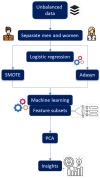Sleep Quality, Nutrient Intake, and Social Development Index Predict Metabolic Syndrome in the Tlalpan 2020 Cohort: A Machine Learning and Synthetic Data Study
- PMID: 38474741
- PMCID: PMC10934807
- DOI: 10.3390/nu16050612
Sleep Quality, Nutrient Intake, and Social Development Index Predict Metabolic Syndrome in the Tlalpan 2020 Cohort: A Machine Learning and Synthetic Data Study
Abstract
This study investigated the relationship between Metabolic Syndrome (MetS), sleep disorders, the consumption of some nutrients, and social development factors, focusing on gender differences in an unbalanced dataset from a Mexico City cohort. We used data balancing techniques like SMOTE and ADASYN after employing machine learning models like random forest and RPART to predict MetS. Random forest excelled, achieving significant, balanced accuracy, indicating its robustness in predicting MetS and achieving a balanced accuracy of approximately 87%. Key predictors for men included body mass index and family history of gout, while waist circumference and glucose levels were most significant for women. In relation to diet, sleep quality, and social development, metabolic syndrome in men was associated with high lactose and carbohydrate intake, educational lag, living with a partner without marrying, and lack of durable goods, whereas in women, best predictors in these dimensions include protein, fructose, and cholesterol intake, copper metabolites, snoring, sobbing, drowsiness, sanitary adequacy, and anxiety. These findings underscore the need for personalized approaches in managing MetS and point to a promising direction for future research into the interplay between social factors, sleep disorders, and metabolic health, which mainly depend on nutrient consumption by region.
Keywords: Mexico City; Tlalpan 2020 cohort; balancing methods; features selection; machine learning; nutrients; poor quality sleep; social development index.
Conflict of interest statement
The authors declare no conflicts of interest.
Figures





References
-
- Romero-Martínez M., Shamah-Levy T., Cuevas-Nasu L., Gómez-Humarán I.M., Gaona-Pineda E.B., Gómez-Acosta L.M., Rivera-Dommarco J.Á., Hernández-Ávila M. Diseño metodológico de la encuesta nacional de salud y nutrición de medio camino 2016. Salud Pública México. 2017;59:299–305. doi: 10.21149/8593. - DOI - PubMed
MeSH terms
Grants and funding
LinkOut - more resources
Full Text Sources
Medical

